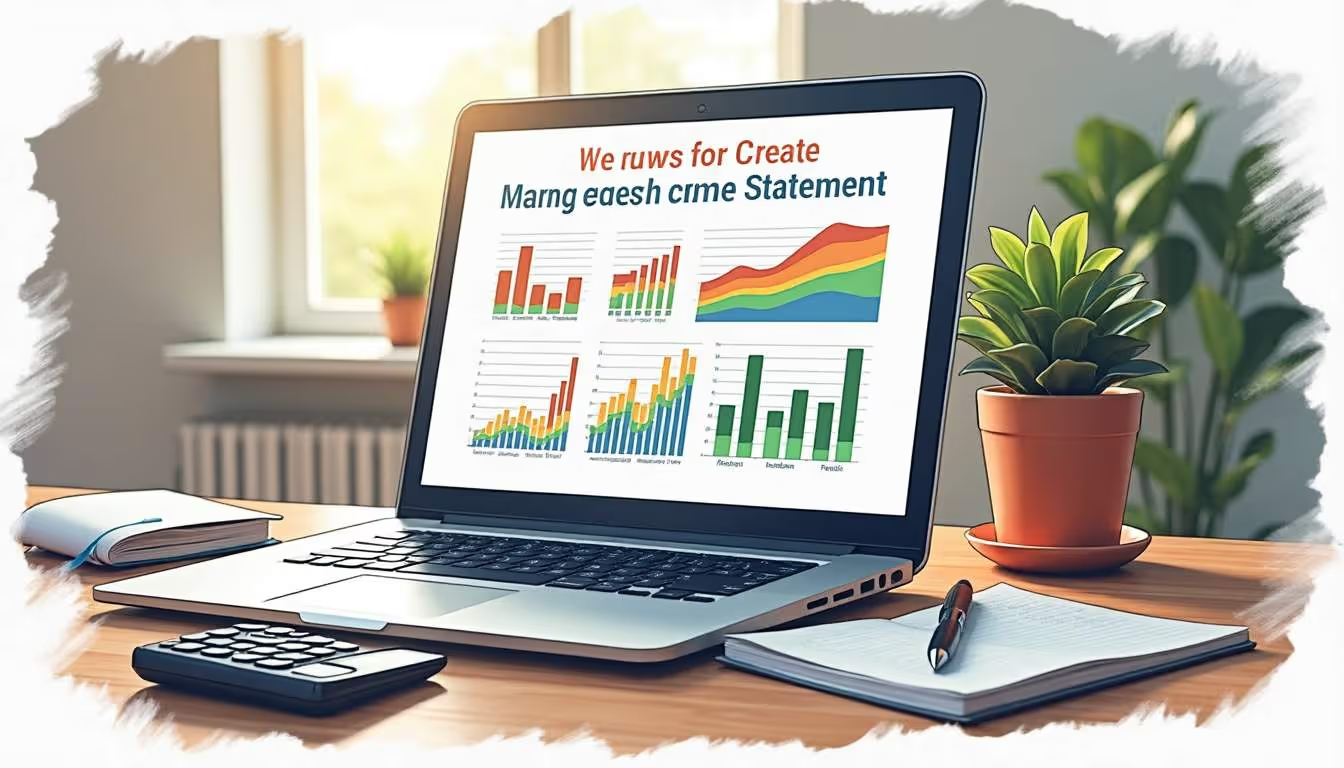How to Generate Management Income Statements for Vacation Rental Homes
In the competitive landscape of vacation rentals, gaining a comprehensive understanding of a property's financial health is essential for achieving success. A pivotal tool in this endeavor is the management income statement. This document offers a detailed summary of the income and expenses linked to a vacation rental home, empowering property owners and managers to make strategic decisions. In this article, we will delve into the process of creating effective management income statements specifically designed for vacation rental properties.
The Significance of Management Income Statements
Management income statements are indispensable for maintaining the financial well-being of vacation rental properties. They provide a snapshot of a property's profitability over a designated timeframe, such as monthly or annually. By scrutinizing these statements, owners can pinpoint trends, control costs, and enhance revenue. This financial instrument not only aids in assessing current performance but also serves as a benchmark for future growth and sustainability, making it a crucial asset for property owners aiming to maximize their investments.
Evaluating Property Performance
The primary function of an income statement is to evaluate a property's performance. By comparing income against expenses, owners can ascertain whether their rental is profitable or incurring losses. This evaluation is vital for making strategic decisions regarding pricing, marketing, and property enhancements. For example, if the income statement indicates a steady decline in occupancy rates, owners may need to reassess their marketing strategies or consider upgrading the property’s amenities to attract more guests. Additionally, a detailed breakdown of income sources—such as nightly rates, cleaning fees, and additional services—can reveal which areas are thriving and which may require attention.
Planning and Forecasting
Income statements are also crucial for planning and forecasting future performance. By analyzing past income and expenses, property managers can develop more accurate budgets and set realistic financial objectives. This foresight aids in preparing for seasonal fluctuations in rental income and managing cash flow effectively. For instance, a property that experiences peak bookings during summer months may need to allocate funds for maintenance and upgrades during the off-peak season. Furthermore, by examining historical data, owners can anticipate potential challenges, such as economic downturns or shifts in local tourism trends, allowing them to adjust their strategies proactively. This level of financial insight not only empowers owners but also enhances their ability to make informed decisions that can lead to long-term profitability and success in the competitive vacation rental market.
Essential Elements of a Management Income Statement
A well-structured management income statement comprises several key elements that offer a comprehensive view of a vacation rental's financial performance. Understanding these elements is crucial for accurately generating the statement.
Revenue Sources
The initial section of an income statement typically outlines the various revenue sources associated with the vacation rental. This may include rental income, cleaning fees, and any additional services offered, such as guided tours or equipment rentals. Categorizing these revenues is important to gain insight into which areas are most profitable. For instance, if guided tours generate a significant portion of income, it may be worthwhile to invest in marketing these services more heavily or to enhance the offerings to attract more guests. Additionally, seasonal variations in rental income can provide insights into peak periods, helping owners strategize pricing and promotional efforts accordingly.
Operational Expenses
Next, the statement should detail operational expenses. These may include property management fees, maintenance costs, utilities, insurance, and property taxes. Breaking down these expenses allows owners to identify areas where costs can be reduced or managed more effectively. For example, regular maintenance can prevent larger repair costs down the line, while energy-efficient upgrades can lower utility bills. Furthermore, owners should consider the impact of fluctuating insurance rates and property taxes, as these can significantly affect overall profitability. By keeping a close eye on these expenses, property owners can make informed decisions that enhance their bottom line.
Calculating Net Income
Finally, the net income is calculated by subtracting total expenses from total revenue. This figure represents the actual profit or loss for the period in question. A positive net income indicates a profitable rental, while a negative figure may signal the need for a reassessment of strategies. It’s also beneficial to track net income trends over multiple periods, as this can reveal patterns and help owners adjust their business strategies proactively. For instance, if net income consistently declines during certain months, it may prompt a review of marketing efforts or pricing strategies during those times. Additionally, understanding the net income in relation to industry benchmarks can provide valuable context, allowing owners to gauge their performance against competitors in the vacation rental market.
Steps to Create a Management Income Statement
Creating a management income statement may seem daunting, but by following a systematic approach, property owners can generate accurate and insightful documents. Below are the essential steps involved in this process.

Step 1: Collect Financial Data
The first step in generating an income statement is to collect all relevant financial data. This includes rental agreements, invoices for services rendered, bank statements, and any other documentation that reflects income and expenses. Organizing this data is crucial for accurate reporting.
Step 2: Categorize Income and Expenses
Once the data is collected, it should be categorized into sections. Create separate sections for different types of income and expenses. This organization will not only simplify the process of creating the income statement but will also make it easier to analyze the financial performance later on.
Step 3: Leverage Accounting Software
Utilizing accounting software can significantly streamline the process of generating management income statements. Many platforms offer templates specifically designed for vacation rentals, making it easier to input data and generate reports. This software can also help automate calculations, reducing the risk of errors.
Best Practices for Crafting Management Income Statements
To ensure that management income statements are effective tools for financial analysis, certain best practices should be followed. These practices help maintain accuracy and enhance the overall usefulness of the statements.

Frequent Updates
Management income statements should be updated regularly, ideally on a monthly basis. Frequent updates allow property owners to monitor their financial performance closely and make timely adjustments as needed. This proactive approach can help prevent financial surprises down the line.
Comprehensive Record-Keeping
Maintaining comprehensive records of all income and expenses is crucial for generating accurate income statements. This includes keeping receipts, invoices, and contracts organized and accessible. Good record-keeping practices not only simplify the statement generation process but also provide a solid foundation for tax reporting and audits.
Seeking Professional Advice
For those who find the process overwhelming, consulting with financial professionals or accountants who specialize in real estate can be beneficial. These experts can provide valuable insights and ensure that income statements are prepared correctly, adhering to accounting standards and regulations.
Interpreting Management Income Statements
Once the management income statement has been generated, the next step is analysis. Understanding how to interpret the data is essential for making informed decisions about the property.
Spotting Trends
Analyzing the income statement over multiple periods can help spot trends in revenue and expenses. For example, if rental income is consistently declining, it may be time to reassess pricing strategies or marketing efforts. Conversely, if expenses are rising without a corresponding increase in income, it may indicate inefficiencies that need to be addressed.
Comparing with Industry Standards
Comparing the property's performance against industry benchmarks can provide valuable context. This can help owners understand how their vacation rental stacks up against similar properties in the area. If the property is underperforming, it may be necessary to investigate potential improvements or changes in management practices.
Strategic Decision-Making
Ultimately, the goal of generating and analyzing management income statements is to inform strategic decision-making. Whether it’s adjusting rental rates, investing in property improvements, or reevaluating marketing strategies, the insights gained from these statements can guide owners toward more profitable outcomes.
Avoiding Common Mistakes
While generating management income statements, there are several common pitfalls that property owners should be aware of. Avoiding these mistakes can lead to more accurate and useful financial reports.
Including All Income Sources
One of the most common mistakes is failing to include all potential income sources. For example, some owners may overlook additional services offered to guests, such as cleaning or concierge services. Ensuring that all income streams are accounted for is essential for an accurate representation of financial performance.
Accounting for Seasonal Variations
Vacation rentals often experience seasonal fluctuations in income. Failing to account for these variations can lead to skewed perceptions of profitability. It’s important to analyze income statements over multiple periods to get a clearer picture of overall performance.
Managing Expenses Effectively
Another mistake is neglecting to monitor and manage expenses effectively. Property owners should regularly review their operating costs and look for opportunities to reduce expenses without compromising the quality of service. This proactive approach can significantly improve the bottom line.
Conclusion
Generating management income statements for vacation rental homes is a crucial aspect of property management. By understanding the importance of these statements, following best practices for creation, and analyzing the results, property owners can gain valuable insights into their financial performance. This knowledge empowers them to make informed decisions that enhance profitability and ensure long-term success in the competitive vacation rental market.

With the right tools and strategies in place, managing the financial aspects of a vacation rental can become a streamlined and effective process. By prioritizing accurate reporting and regular analysis, property owners can not only maintain but also grow their investments in the vacation rental industry.
Ready to take the complexity out of financial management for your vacation rental business? With VRPlatform, you can automate your accounting processes, integrate seamlessly with your Property Management Systems, and ensure trust accounting compliance with ease. Whether you're a property manager, an accounting partner, or a property owner, VRPlatform provides the tools you need to gain financial transparency and drive growth. Sign up for a free trial today and experience the benefits of a streamlined, transparent financial reporting system tailored to the vacation rental industry.



